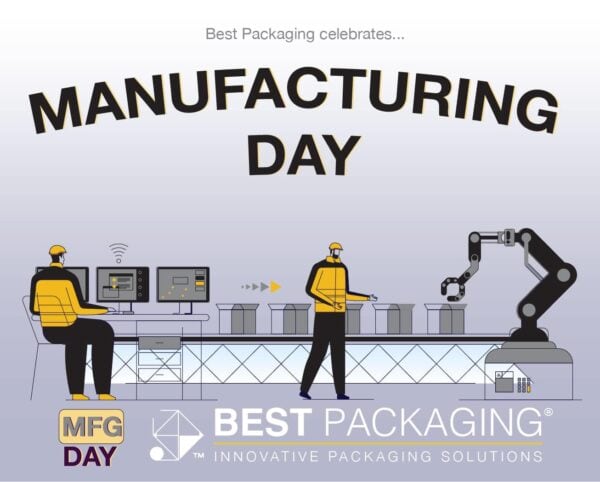Today, Best Packaging observes Manufacturing Day! MFG Day, as it’s known, is an industry wide campaign to highlight career paths in manufacturing. We feel it is important to educate the public on the role manufacturers play in our everyday lives. Consider the chair you may be sitting in, or the cup you may be drinking from… Did you know?
There are 4 general types of manufacturing processes…

Casting and Molding:
Generally speaking, this is the process of forming raw materials (typically liquids or powders) into a desired shape. In this process, the shape is determined by a mold, or an outer layer that the material is pushed against. Materials, often metals and plastics, are formed through the process of injection molding, blow molding, compression molding, or rotational molding.
Machining:
Often times manufacturing involves the use of heavy duty machinery. If the fabrication of a finished good involves, cutting, drilling, grinding or otherwise removing parts from the whole using industrial equipment, this is considered machining.
Joining:
Casting new shapes and using machines to take parts from a whole can only get you so far. Eventually the pieces need to be put together, and that’s where joining comes in. Some joining processes, like welding, require heat. Other common forms of joining include fastening (nails, screws, staples) or adhesive bonding.
Sheering and Forming:
Sheering, also known as die-cutting, is a two dimensional, reductive process with a specific shape in mind. Consider this like a highly sophisticated cookie cutter. Forming is the process of obtaining the required shape and size of a material by subjecting the raw material to stress, such as temperature changes, mechanical or electromagnetic force.
Using the processes outlined above, manufacturers typically have one of three end goals:
MTO (Made to Stock)
This is, essentially, any product you can go to a store and buy. Items are manufactured to maintain a certain level of inventory, without a specific end-user in mind.
MTA (Make to Assemble)
Manufacturers keep components on hand, but manufacturing of the finished good does not start until an order is placed. These items are made to fulfill a specific order, but since they use components from their stock, there is little to no room for customization.
MTO (Made to Order)
MTO manufacturers create items to customer specifications after they are ordered. For MTO products, many manufacturers may not be triggered to order certain components until after an order is placed.
Common Careers in Manufacturing
Assembler/ Fabricator
Assemblers and fabricators put together pieces of products and/or assemble finished products. They use their hands, as well as tools and machines. Most assemblers and fabricators work in manufacturing plants. Most of these positions require a high school diploma, but many employees can get on-the-job training.
Machine Operator
Machinists and tool-and-die makers set up, maintain, and operate computer and mechanically-operated machines used to create parts for the manufacturing process. These positions require training, either in apprenticeship programs, vocational schools, or community or technical colleges. These employees also receive lots of on-the-job training.
Mechanical or Robotics Engineer
Mechanical engineers research, design, develop, or test various systems, including automation, intelligent systems, smart devices, or industrial systems control. Mechanical engineers design other machines inside buildings, such as elevators and escalators. Typically, a bachelor’s degree in robotics or mechanical engineering is needed.
Production Manager
Production managers oversee the day-to-day operations at manufacturing plants. They ensure that production stays on schedule, they hire and manage workers, and they fix any production problems. Many production managers will have a bachelor’s degree, typically in business or industrial engineering.
Quality Control Inspector
Quality control inspectors monitor quality standards for nearly all manufactured products, including foods, textiles, clothing, glassware, motor vehicles, electronic components, computers, and structural steel. Specific job duties vary across the wide range of industries in which these inspectors work. Typically a high school diploma or equivalent is required. Some rolls require Quality Control Certification as well.
Did you know there were approximately 592,000 manufacturing jobs in our home state of Illinois last year? Learn more about the local impact of this industry by visiting the National Association of Manufacturer’s webpage. https://www.nam.org/state-manufacturing-data/2020-illinois-manufacturing-facts/
What’s your take? We welcome guest bloggers! E-mail socialmedia@bestpackaging.com if you’d ever like to collaborate.
